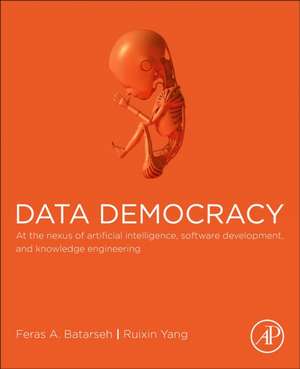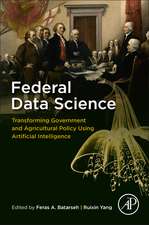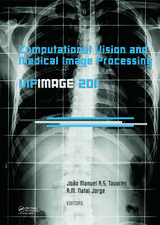Data Democracy: At the Nexus of Artificial Intelligence, Software Development, and Knowledge Engineering
Autor Feras A. Batarseh, Ruixin Yangen Limba Engleză Paperback – 13 ian 2020
- The future of the data republic, life within a data democracy, and our digital freedoms
- An in-depth analysis of open science, open data, open source software, and their future challenges
- A comprehensive review of data democracy's implications within domains such as: healthcare, space exploration, earth sciences, business, and psychology
- The democratization of Artificial Intelligence (AI), and data issues such as: Bias, imbalance, context, and knowledge extraction
- A systematic review of AI methods applied to software engineering problems
Preț: 717.51 lei
Preț vechi: 939.41 lei
-24% Nou
Puncte Express: 1076
Preț estimativ în valută:
137.30€ • 146.82$ • 114.47£
137.30€ • 146.82$ • 114.47£
Carte tipărită la comandă
Livrare economică 10-24 aprilie
Preluare comenzi: 021 569.72.76
Specificații
ISBN-13: 9780128183663
ISBN-10: 0128183667
Pagini: 266
Dimensiuni: 191 x 235 x 14 mm
Greutate: 0.46 kg
Editura: ELSEVIER SCIENCE
ISBN-10: 0128183667
Pagini: 266
Dimensiuni: 191 x 235 x 14 mm
Greutate: 0.46 kg
Editura: ELSEVIER SCIENCE
Public țintă
AI, data science, and machine learning researchers; Data scientists and policy makers; Data analysts interested in open data, open science, and open code; Academics and practitioners deploying data for earth sciences, healthcare, government, and psychology, all citizens of the data republicCuprins
Section I The data republic1. Data democracy for you and me (bias, truth, and context)2. Data citizens: rights and responsibilities in a data republic3. The history and future prospects of open data and open source software4. Mind mapping in artificial intelligence for data democracy5. Foundations of data imbalance and solutions for a data democracy
Section II Implications of a data democracy6. Data openness and democratization in healthcare: an evaluation of hospital ranking methods7. Knowledge formulation in the health domain: a semiotics-powered approach to data analytics and democratization8. Landsat’s past paves the way for data democratization in earth science9. Data democracy for psychology: how do people use contextual data to solve problems and why is that important for AI systems?10. The application of artificial intelligence in software engineering: a review challenging conventional wisdom
Section II Implications of a data democracy6. Data openness and democratization in healthcare: an evaluation of hospital ranking methods7. Knowledge formulation in the health domain: a semiotics-powered approach to data analytics and democratization8. Landsat’s past paves the way for data democratization in earth science9. Data democracy for psychology: how do people use contextual data to solve problems and why is that important for AI systems?10. The application of artificial intelligence in software engineering: a review challenging conventional wisdom
Recenzii
"Not sure what data democracy is? But your interest is piqued because it has sounds “data in the title? Well, you should be interested and you’ll understand the term well if you give Data Democracy a thorough read.The author claims the book to be a manifesto for data democracy, and it succeeds in that challenge. Everybody is part of the “data republic and therefore needs to be aware of their data… who has access to it, how they got access to it, how it is being used, how it is protected, and more. In short, data democracy is the concept of sharing data instead of letting it be monopolized by a few large concerns. Of course, it is not quite that simple, so a book is needed… this book. If you consume or create data – and at this point who does not – you will benefit by reading Data Democracy." --Data and Technology Today






















